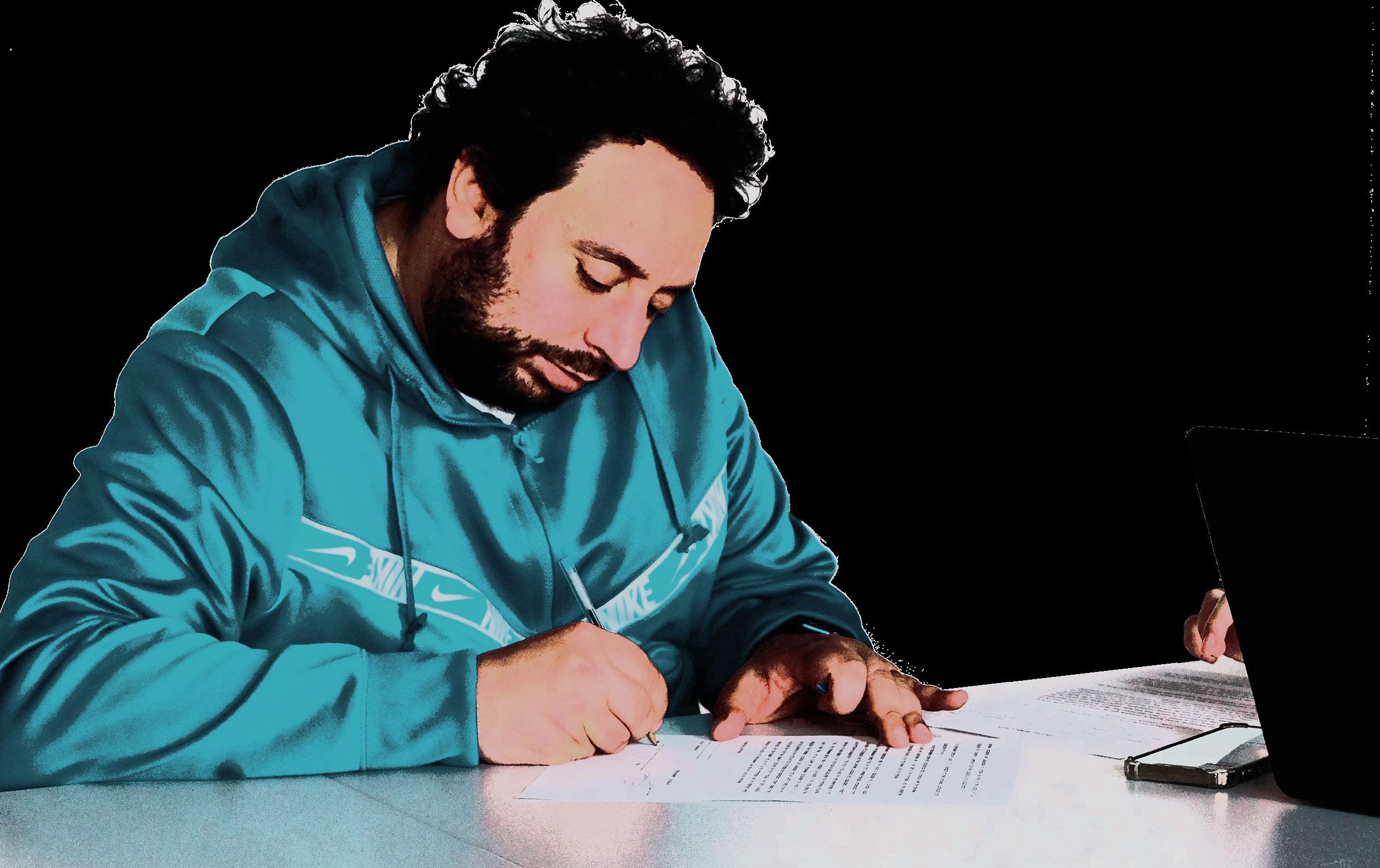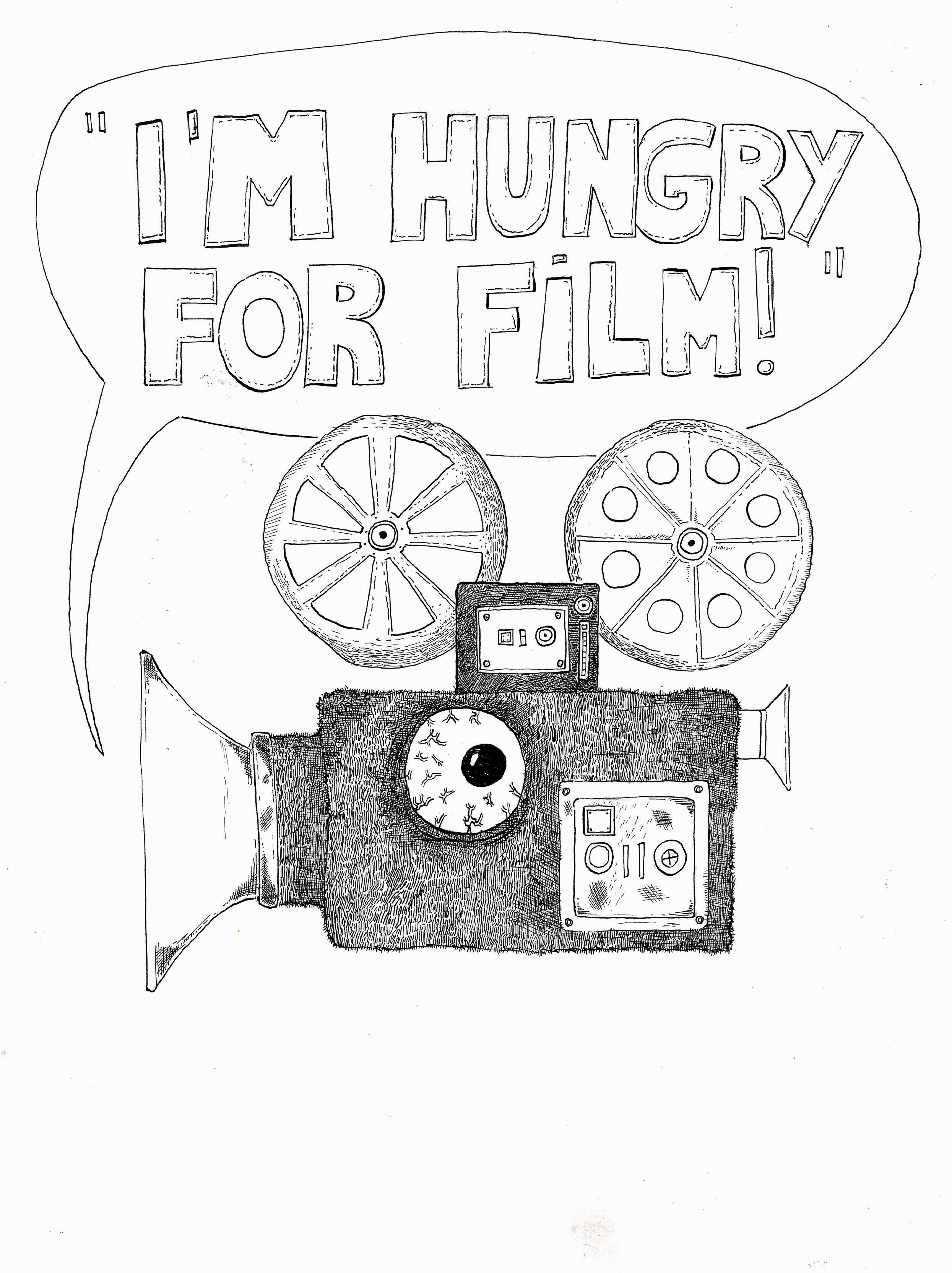
10 minute read
Are we there yet?
Interview with a film maker
Interview with Adolf El Assal
Advertisement
In March 2020 the first ever Luxembourgish fiction feature, Sawah (2019), was released on Netflix. I remember being impressed by this film so much that I dedicated a whole review to it. I wrote: “As a film director who had taken a number of attempts at taming Comedy, I know firsthand that she is a difficult child.
Not everyone who tries succeeds at bringing her up to be decent; but those who do, possess an exceptional talent. [...] the film tells a story about an artist who, on his way to an art event, accidentally gets detained in Luxembourg and cannot leave the country [...] I laughed so much! I remember the professors kept telling us, for the viewer to like it, a story must first of all be relatable.
What a film! Luxembourg from a perspective of a strayed foreigner [...] so perfectly captured, you bet relatable it was.”
Adolf El Assal, the director of Sawah (2019), is a great storyteller. He is a talented and conscientious producer, too. Among other things, his production company, Wady Films, recently helped bring about the Ukrainian masterpiece Pamfir (2022) - a picture so very engaging, authentic and poetic!
Now, guess what? This man, whom I respect and admire, let me interrogate him for the dear readers of ROUX! So, get your pens and highlighters ready - we shall now learn how to build ourselves up from being homeless to making history.
sofiya_10billion: Present yourself in 2 sentences.
Adolf El Assal: 2 sentences? Oh, that’s a big challenge [laughs]. My name is Adolf El Assal. I’m 41 years old. I’m a filmmaker. My production company is called Wady Films and... I’ve been making films for the past 15 years or so. Is it enough or should I say something more?

Artist menu in the making
S: Maybe you can tell us very briefly about your journey.
A: Yeah, okay. Well, I was born in Egypt in 1981. And I came to Luxembourg by mistake when I was 7 years old. I grew up in this country here until I was 21 (when I finished high school).
Then I went to the United Kingdom to go to university where I studied, first of all, Bachelor in Media and Culture Studies and also did a bit of journalism. After that, I took a year off.
Later I went back to university and did a Master’s in filmmaking. I graduated in 2008 from King’s University in the UK, and since then I’ve been working in the business.
A: Costly? It depends. [...] to make films, it costs a lot of money. But, just to tell you, when I made my first film, which I shot with my two friends, it had zero budget... yeah, zero, simply zero. [...] All we paid for was a trip to Uganda in East Africa where we spent 18 days. We shot a film with the people there. We just had a story line but we improvised the dialogue and so on. [...]
Technically it wasn’t the best thing, but we managed to make a film. At the beginning we wanted to just make a short film but it became a feature. Two years later the film was shown in the Berlin Film Festival in the Official Selection next to all the biggest directors in the world, okay? One cannot even believe what we experienced. The film went to all the top festivals in the world. We traveled so much. [...] But we got screwed financially. With that film we haven’t made a single cent still until today, okay? Because we didn’t know the whole business side.
People, they used us... They made a lot of money behind our backs, and for us, we never got anything out of it because we signed papers out of excitement and so on. But that was an experience. That’s what gave me the confidence that we COULD make films.
[...] Today, I am happy as a producer, my production company is one of the biggest in Luxembourg. We have films that travel all over the world. And then coming back to the costliness of films, over time I learned that you need money to make films
Not for every film, but you need money to make really professional films. You have a professional crew to pay, you have actors to pay, you have locations to pay - all this costs money, okay? And you don’t get it like that, which I really respect.
[...] Here in Europe in general, a lot of people... they don’t feel... when they make a film they don’t see that it’s a privilege to make a film with money and a crew. It’s a real privilege. A lot of people completely forget that. And that’s why when you see their films, well... [...]
Most of those who made their first feature [with a normal or a big budget], they never did a second feature. Because they were crushed either by the industry itself, or by the audience of the film. The film is not good because they don’t have the experience.
S: Do you think that people who come from a less privileged background stand a chance at succeeding in this industry?
A: I’m a good example of that, like really. I came from the deepest poverty you can imagine. [...] It’s always good when you have life experience that makes you a better filmmaker. I think that most people that inspired me, they really came from nothing. They know how it is to struggle in life, okay? ‘Cause that’s where the best stories come from.
S: What do you think about film schools? Would you recommend attending film school to everyone?
A: Can I say this in an educational magazine? [laughs] One of my goals in life is, I would like to open a film school, okay? ‘Cause also part of my story is that I tried to go to all the fancy film schools, and no one ever accepted me. They said I wasn’t interesting enough, wasn’t rich enough, I don’t know...
S: The production of multimedia and, in particular, of films is fairly costly, would you agree?
A: Costly? It depends. [...] to make films, it costs a lot of money. But, just to tell you, when I made my first film, which I shot with my two friends, it had zero budget... yeah, zero, simply zero. [...] All we paid for was a trip to Uganda in East Africa where we spent 18 days.
We shot a film with the people there. We just had a story line but we improvised the dialogue and so on. [...] Technically it wasn’t the best thing, but we managed to make a film.
At the beginning we wanted to just make a short film but it became a feature. Two years later the film was shown in the Berlin Film Festival in the Official Selection next to all the biggest directors in the world, okay? One cannot even believe what we experienced.
The film went to all the top festivals in the world. We traveled so much. [...] But we got screwed financially. With that film we haven’t made a single cent still until today, okay? Because we didn’t know the whole business side. People, they used us...
They made a lot of money behind our backs, and for us, we never got anything out of it because we signed papers out of excitement and so on. But that was an experience. That’s what gave me the confidence that we COULD make films.

My camera ended up having pizza for reels
S: What is the most common reason people fail?
A: People fail, for me, because of lack of self-confidence. [...] If you’re a screenwriter or a director - that’s the most frustrating job in the world because it takes so long to write something and then to persuade people to give you money for you to do what you have written.
S: Do you think it’s hard to combine working in the film industry with having a family life?
A: It depends. [...] I’m very lucky ‘cause my wife, she is also an artist. [...] I was here in Luxembourg from 2012 to 2017... like for five years I didn’t make 1 cent working, I couldn’t find a job, I was focused just on my script “Sawah”, okay?
And I was struggling so much to pay my rent. It was really crazy but my wife, she supported me really a lot. I had a space where I could focus on my work and so on and so forth. And then one day I finally got financed to make my film with proper means because we both believed in it.
S: So, would you say that an artist needs to be hungry?
A: Absolutely! You need to be very-very hungry, okay? And also be foolish, you know what I mean? Just to tell you, 10 years ago I was living in my car for almost a year. Here in Luxembourg.
The thing is, I really believed so much in myself, I told myself: “I’m gonna make it, I don’t care, I’m gonna make it”. I was living in my car and I wasn’t getting any social help because I didn’t have an address.
I’m Luxembourgish, I have a Luxembourgish passport, but no social system, nothing wanted to help me. [...] I was just living in my car, sometimes selling a DVD here and there, whatever.
And then step-by-step I managed to build myself up, okay? Because I was so hungry I knew I had to make it. And now everything’s changed...
S: Do you feel that you’re happy with where you’re at in your life right now?
A: Right now? I can’t be happier! [...] My last film for example, Sawah, I sacrificed everything to make this film: I sacrificed my own salary just to be able to do it because the producer didn’t believe in me. And the only thing where I was lucky enough is that I kept a lot of the rights (the producers don’t care about the rights when they think they will not make any money with the film). [...] So, since I had the rights, I approached Netflix myself and I negotiated with them.
[...] The 14th of May 2022 is when the film got released [on Netflix] and became such a huge success all over the world! [...] And thanks to that film I managed to do a TV series which is also on Netflix, it’s called Baraki. It also became such a huge hit.
Now I’m doing my next feature film. Now at my own production company we have 8 feature films coming out next year alone, including Pamfir - the film that was at Cannes this year.
S: I’m really glad to hear that you’re happy! I hope things will keep coming your way.
A: I’m also happy because of my wife. I am so grateful that she sacrificed so much for me, that she really supported me from day one.
S: Any final words of inspiration for our readers and all the aspiring filmmakers?
A: Ooph, inspiration... believe in yourselfthat’s super important, no matter what you do, really. [...] If people tell you “no”, accept the “no”, no problem. Just show them that you can make it, okay? [...] Everyone told me: “You’ll never make it, you’re not interesting”.
I said: “No problem, I’m gonna show you!” [...] But don’t make films - also, anything - don’t make it just to be on top. It’s not healthy [...] Let’s put it like this: believe in yourself, stay humble and be yourself.
by sofiya_10billion









